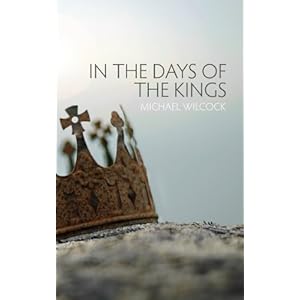
In St Elizabeth's, we're currently preaching through a series on the life of the prophet Elijah, and this is one of the books that was very useful in preparing the series - not so much in the detail of Elijah's life, but in terms of giving a great historical background to the period of the monarchy in Israel and Judah.
As Michael Wilcock says early on, 'many have little idea what is in [the Old Testament]' - even among those who know what it is! This book aims to, and also achieves the making known of the reigns of the kings, 'both fascinating and challenging.' For the modern reader delving into Samuel, Kings and Chronicles, those books can seem confusing, with the two separate kingdoms of Israel and Judah, and the many kings. This book gives a straightforward overview of the whole period, helping readers find their bearings, and highlighting the encouragements and challenges each king faced - and how they relate to the true king.
Asserting at the outset that, despite the varieties of models of kingship in the nations around Israel, 'the Lord, Yahweh, was its invisible king', Wilcock traces the development of the monarchy, partly through God's intention, and partly through the people's rebellion against the invisible king. There are perceptive comments:
'The ever-present human desire to be in tune with the spirit of the age, the dislike of being 'different', which is the precise opposite of the distinctiveness, the 'holiness' to which Yahweh repeatedly called his people.'
Therefore, when Saul is chosen as king, 'Yahweh saw to it that the person they chose was the one he meant them to choose.'
Similarly, on Jeroboam's establishment of new religious sites at Dan and Bethel in the new realm of Israel, 'But everything would be according to his plan, not Yahweh's. Designed for people who were more interested in the outward trappings of worship than in the God they were supposed to be worshipping, the whole system was a shameless imitation of the one based in Jerusalem.'
And perhaps most devastating, on Jehoiakim's reign: 'The people decided that they could put up with the faith of Yahweh after all, provided they could willfully misunderstand it to mean that as long as they looked after 'religion' Yahweh would look after them, however godless their thinking, however immoral their lives.'
As an introduction to the Old Testament, it's really good, and certainly motivates you to dive into the biblical texts themselves to see what happened in greater detail. Those long lists of kings, particularly those found in Matthew's genealogy of Jesus come to life as their stories are recounted.
One small gripe was that there are few Bible references for the reader to quickly and easily find the link direct to the passages Wilcock is referring to. Sometimes there's just a reference to (e.g.) in 2 Kings, sometimes not even that. However I would still recommend this book as a valuable one for people seeking to grasp the movement and meaning of the Old Testament monarchy.
No comments:
Post a Comment